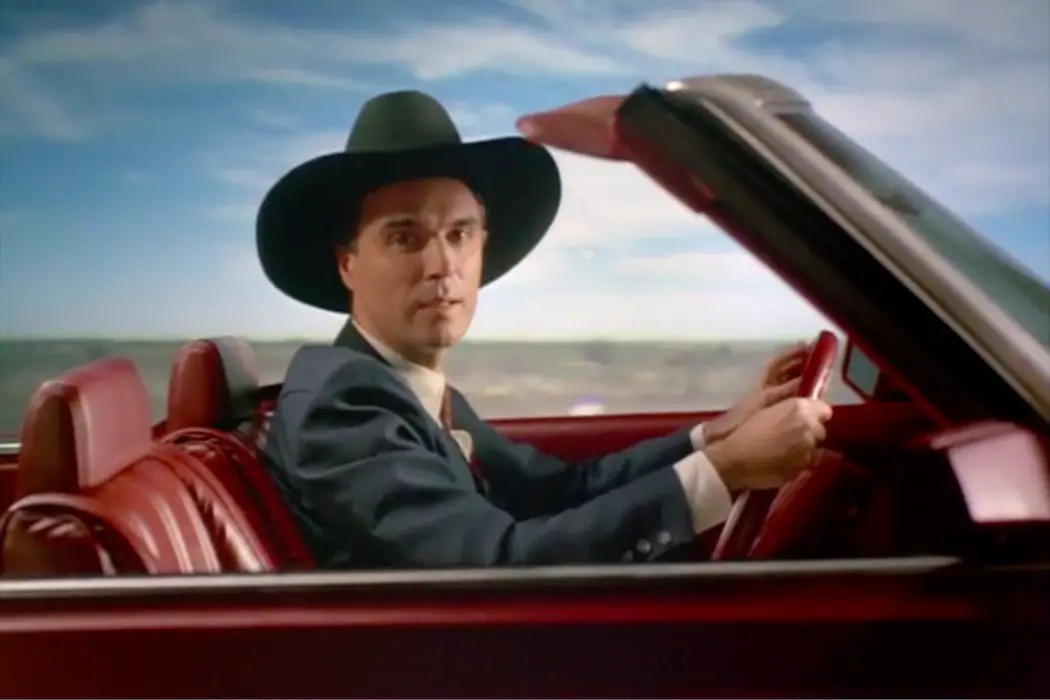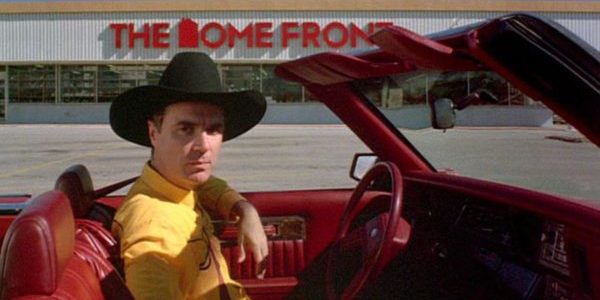TRUE STORIES: Criterion Resuscitates David Byrne’s Lone Masterpiece

Midwesterner, movie lover, cinnamon enthusiast.
While reviewing The Gingerbread Man re-release, I mentioned films I first came into contact with 15 years ago via Wal-Mart’s $5 DVD bin — David Byrne ’s 1986 film True Stories was one of those. I wasn’t previously aware of the film’s existence, but I could recognize a David Byrne creation when I saw one. I watched it once, thought it was bizarre, put it on the shelf. It doesn’t surprise me that seeing it now, both 15 years older and, more importantly, on a restoration that finally presents the film in widescreen, feels like seeing it for the first time.
Byrne’s first and last film is a tableau narrative about the eccentric citizens of Virgil, Texas leading up to the town’s talent show honoring its sesquicentennial. We meet a man running television ads to find a wife, a woman who doesn’t leave her bed, a happily married couple who don’t speak to each other, and many others that Byrne and his two Texas-native co-writers Stephen Tobolowsky and Beth Henley ripped from the tabloid headlines. Byrne himself plays a visitor from the coast — the only one in typical Texan garb — and our tour guide, literally addressing the viewer on occasion.

The idea of a being guided by an outsider through an insulated, eccentric and diverse landscape evokes Geraldine Chaplin in Robert Altman’s Nashville, whose screenwriter, Joan Tewkesbury, incidentally gave Byrne the idea (while refusing to write the film’s script) to tell his story in a similarly collage nature rather than a straightforward attempt at narrative. Whereas Chaplin, who played a British reporter covering the country music scene, held a literal microphone up to folks, Byrne figuratively offers the same affordance — he stays out of the way, there to give a platform to the folk of Virgil.
The Initial Reaction
The film got a largely negative critical reaction upon release — though it had its defenders, like Roger Ebert — most of which were tied to assumptions of Byrne’s point of view, reading him as an interloper coming to laugh at the simple folk of Small Town, USA.
Writing for the Washington Post , Paul Attanasio said the film “wasn’t about the South, but SoHo,” going on to posit the film makes no connection to the characters but is more indicative of Byrne’s alienation from such a world, while ironically damning the film for its “lowbrow humor.” Rita Kempley, of the same paper, called it “formica nostalgia” and was annoyed at Byrne’s “lampooning” of the shopping mall, while the Chicago Reader ’s Pat Graham called it a one-dimensional satire.

On Marc Maron’s podcast, WTF , the host asked Byrne about his attitude toward the “flyover states” and being misinterpreted regarding a song like “The Big Country,” where he sings the chorus, “I wouldn’t live there if you paid me to.” Given his first-person address, it’s easy to understand why people unfamiliar with the Talking Heads might take a face-value interpretation of the song. However, I have a harder time giving such an allowance for likewise interpretations of True Stories, which, to this viewer, lacks any semblance of character-pointed satire.
If you want to call it satire, the most reasonable defense would be the film’s attitude toward industrialization and Silicon Valley. In fact, Byrne’s characterization of Silicon Valley, today, reads incredibly prescient. Between the budding computer scientist’s quoting of Steve Jobs and Spalding Gray ’s speech about the merging of work and play, it’s apparent America’s current problems specific to web-based entrepreneurialism have been brewing for quite some time.
Resuscitated for a New Generation
On the new documentary regarding the film’s making, Byrne talks about how industrialized society in the 80s was siloing people into either creators or consumers, but he wanted, with the film, to showcase how the folks being cast as merely consumers are often creating their own art. There’s a note following the end credits, “If you can think of it, it exists somewhere,” that, while it means something differently in the internet age, punctuates the film’s bewondered celebration of hidden eccentricity and the country’s diverse personality.
Despite the initial reaction from the critical cognoscenti, it’s safe to say Byrne’s film has had enough champions to withstand the cultural dustbin, which is fortunate since, until now, those advocates haven’t had a proper home video release to really relish the film and share it with others. With Criterion’s Blu-ray, the film will be able to not only satiate its old fans, but find new ones, just as every new generation eventually discovers the discography of the Talking Heads.

To celebrate the unknown creators of American culture, Byrne brings to his only film a weird sensibility the same way fellow one-and-done filmmaker Charles Laughton brought an unfamiliar touch to his lone credit, Night of the Hunter. With True Stories, we have the rest of Byrne’s music career to put this project into perspective with, which gives it a familiarity, but on its own, as a piece of filmmaking, it’s an unusual work that benefits from a lack of (or disregard for) traditional filmmaking vernacular.
The Disc
Among the disc’s bounty of supplements, the new documentary on designer Tibor Kalman and the new documentary on the film’s production stand above the rest. Both work in tandem to frame True Stories as a product of collaboration, not a work solely of Byrne’s mad genius. Among the many notable collaborators celebrated are the casting department, cinematographer Ed Lachman , famous photographer William Eggleston and filmmaker Jonathan Demme, who of course previously directed the Talking Heads concert film Stop Making Sense.
Concerning True Stories, Byrne credits Demme with putting in place a “clock” device — the talent show that the film leads toward. Because the viewer knows we’re headed toward a concluding event, the film is able to more comfortably luxuriate in its tableau narrative rather than build unnecessary character arcs.
Demme’s own 1986 film Something Wild, which Byrne created an original song for, would play as a nice double bill next to True Stories . Both are playful films that explore the yuppy out of context in dramatically different fashions.
The release comes with a sleeve-packaged CD of the film’s soundtrack. Despite the Talking Heads LP True Stories and a later release called Sounds from True Stories, this is the first time the film’s soundtrack has been completely compiled. As grateful as I am for it, it is weird that, in the year 2018, it is only released on CD. I would’ve expected Criterion, like Grasshopper with their Bertrand Bonello vinyl, accompanied it with a digital download code.
Anyway, I put the disc in my only CD player, the one in my car, and drove around with it on loop for a week. Listening to the soundtrack isolated from the film, beyond just a joy, was useful in confirming the film’s adjacency to Godfrey Reggio’s 1982 essay film Koyaanisqatsi , scored by Philip Glass . They’re distinctly different films, but both narratively strange, music-forward, postmodern films about civic arrangement, consumerism and landscapes, and some of the instrumental music of True Stories momentarily skews toward a rhythm recalling Glass’ inimitable sound. A few of the instrumental tracks also sound like a precursor to Belle & Sebastian’s score of Todd Solondz’s 2001 film Storytelling .
True Stories: Conclusion
Criterion’s package also comes with a beautiful miniature newspaper, in lieu of a booklet, that contains a couple new essays, an archival essay from Gray and new and archival work from Byrne. True Stories was a film that was in dire need of resuscitating in HD, and in the process of doing so, Criterion has put out one of their most creative sets to date, aptly matching the eccentric register of Byrne’s masterpiece.
True Stories is now available from the Criterion Collection.
https://www.dailymotion.com/video/x54kthe
Does content like this matter to you?
Become a Member and support film journalism. Unlock access to all of Film Inquiry`s great articles. Join a community of like-minded readers who are passionate about cinema - get access to our private members Network, give back to independent filmmakers, and more.












